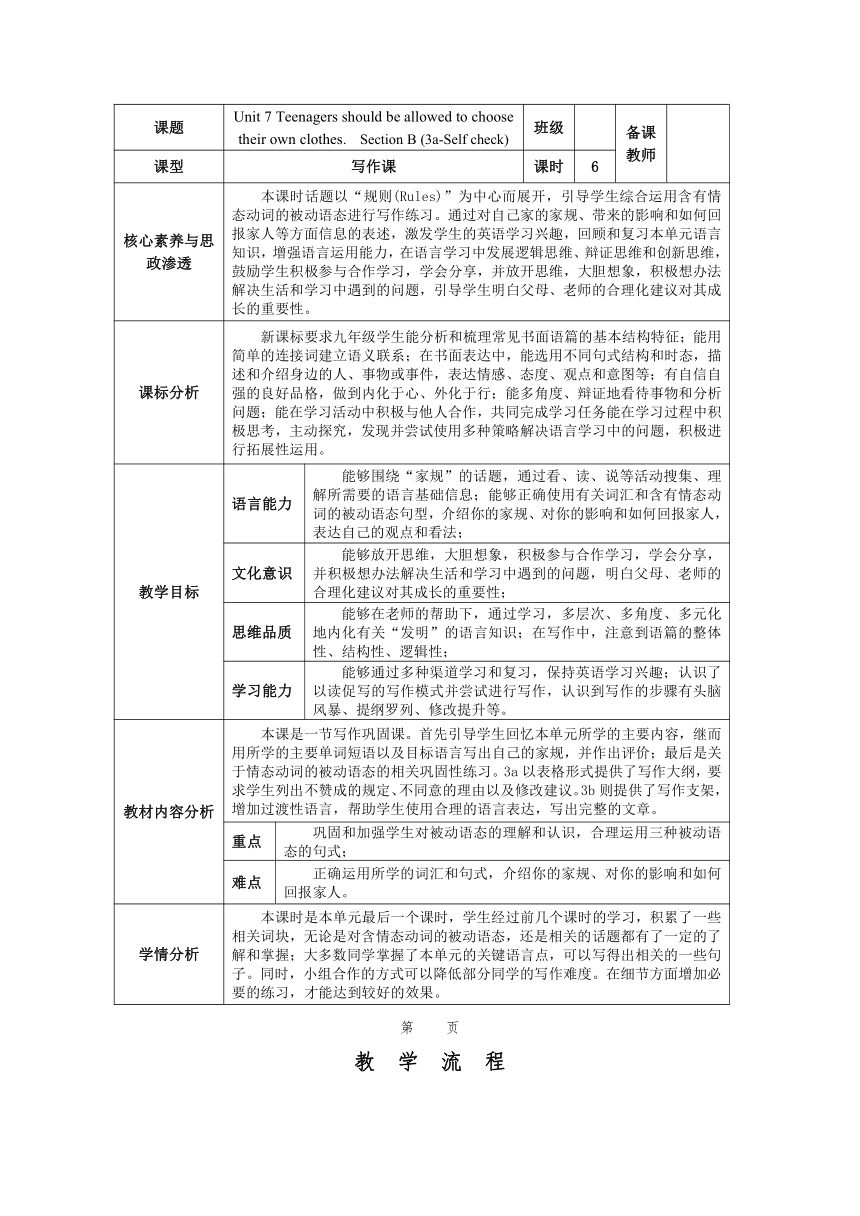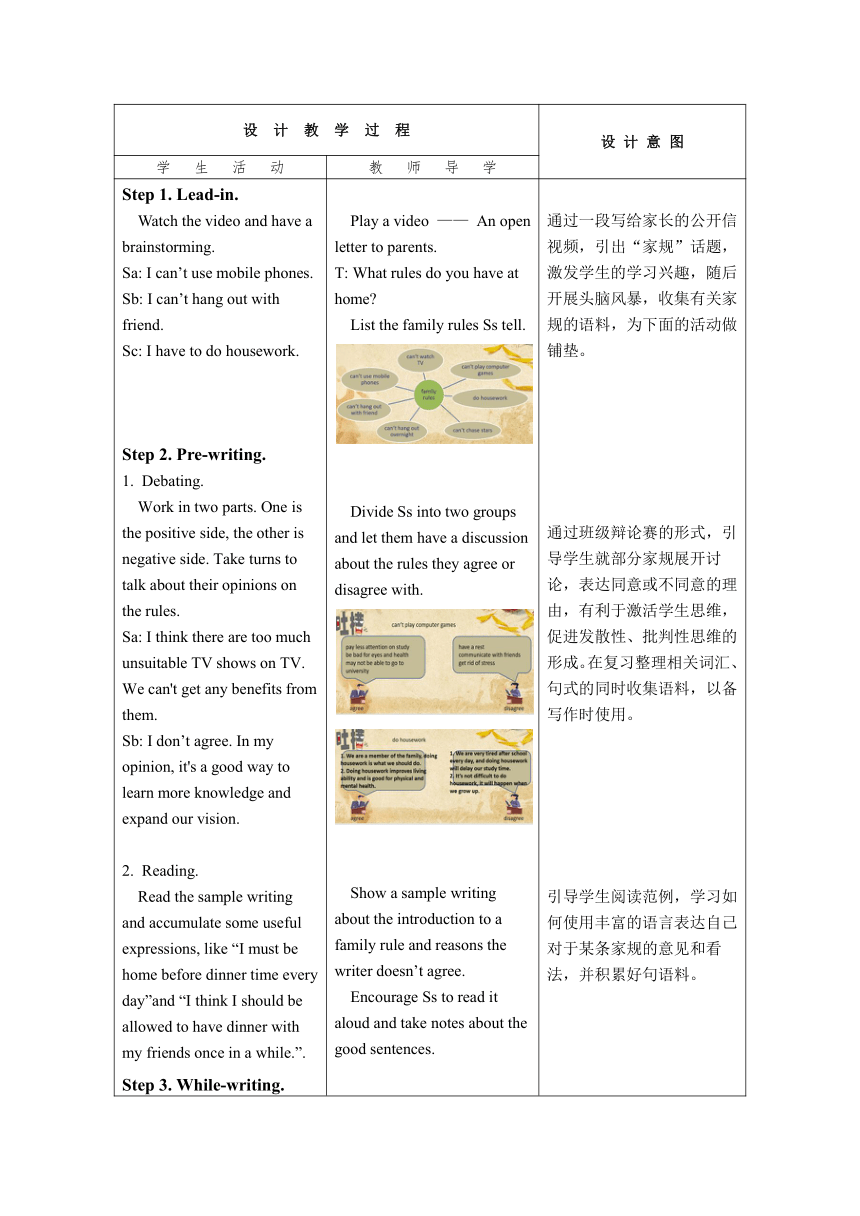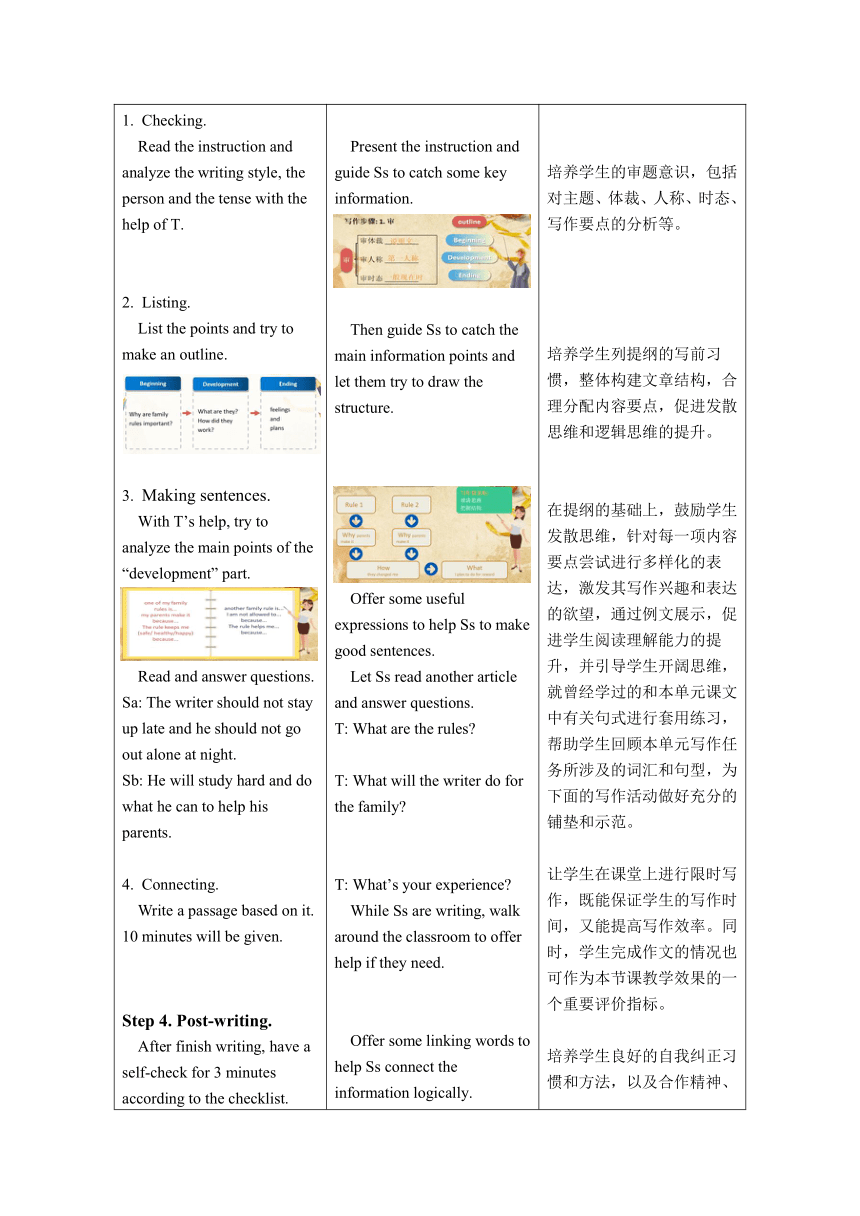人教版九年级全册Unit7Teenagers should be allowed to choose their own clothes 第六课时教学设计写作课(表格式,含核心素养目标)
文档属性
| 名称 | 人教版九年级全册Unit7Teenagers should be allowed to choose their own clothes 第六课时教学设计写作课(表格式,含核心素养目标) |

|
|
| 格式 | docx | ||
| 文件大小 | 945.5KB | ||
| 资源类型 | 教案 | ||
| 版本资源 | 人教新目标(Go for it)版 | ||
| 科目 | 英语 | ||
| 更新时间 | 2024-09-24 00:00:00 | ||
图片预览



文档简介
课题 Unit 7 Teenagers should be allowed to choose their own clothes. Section B (3a-Self check) 班级 备课教师
课型 写作课 课时 6
核心素养与思政渗透 本课时话题以“规则(Rules)”为中心而展开,引导学生综合运用含有情态动词的被动语态进行写作练习。通过对自己家的家规、带来的影响和如何回报家人等方面信息的表述,激发学生的英语学习兴趣,回顾和复习本单元语言知识,增强语言运用能力,在语言学习中发展逻辑思维、辩证思维和创新思维,鼓励学生积极参与合作学习,学会分享,并放开思维,大胆想象,积极想办法解决生活和学习中遇到的问题,引导学生明白父母、老师的合理化建议对其成长的重要性。
课标分析 新课标要求九年级学生能分析和梳理常见书面语篇的基本结构特征;能用简单的连接词建立语义联系;在书面表达中,能选用不同句式结构和时态,描述和介绍身边的人、事物或事件,表达情感、态度、观点和意图等;有自信自强的良好品格,做到内化于心、外化于行;能多角度、辩证地看待事物和分析问题;能在学习活动中积极与他人合作,共同完成学习任务能在学习过程中积极思考,主动探究,发现并尝试使用多种策略解决语言学习中的问题,积极进行拓展性运用。
教学目标 语言能力 能够围绕“家规”的话题,通过看、读、说等活动搜集、理解所需要的语言基础信息;能够正确使用有关词汇和含有情态动词的被动语态句型,介绍你的家规、对你的影响和如何回报家人,表达自己的观点和看法;
文化意识 能够放开思维,大胆想象,积极参与合作学习,学会分享,并积极想办法解决生活和学习中遇到的问题,明白父母、老师的合理化建议对其成长的重要性;
思维品质 能够在老师的帮助下,通过学习,多层次、多角度、多元化地内化有关“发明”的语言知识;在写作中,注意到语篇的整体性、结构性、逻辑性;
学习能力 能够通过多种渠道学习和复习,保持英语学习兴趣;认识了以读促写的写作模式并尝试进行写作,认识到写作的步骤有头脑风暴、提纲罗列、修改提升等。
教材内容分析 本课是一节写作巩固课。首先引导学生回忆本单元所学的主要内容,继而用所学的主要单词短语以及目标语言写出自己的家规,并作出评价;最后是关于情态动词的被动语态的相关巩固性练习。3a以表格形式提供了写作大纲,要求学生列出不赞成的规定、不同意的理由以及修改建议。3b则提供了写作支架,增加过渡性语言,帮助学生使用合理的语言表达,写出完整的文章。
重点 巩固和加强学生对被动语态的理解和认识,合理运用三种被动语态的句式;
难点 正确运用所学的词汇和句式,介绍你的家规、对你的影响和如何回报家人。
学情分析 本课时是本单元最后一个课时,学生经过前几个课时的学习,积累了一些相关词块,无论是对含情态动词的被动语态,还是相关的话题都有了一定的了解和掌握;大多数同学掌握了本单元的关键语言点,可以写得出相关的一些句子。同时,小组合作的方式可以降低部分同学的写作难度。在细节方面增加必要的练习,才能达到较好的效果。
第 页
教 学 流 程
设 计 教 学 过 程 设 计 意 图
学 生 活 动 教 师 导 学
Step 1. Lead-in. Watch the video and have a brainstorming. Sa: I can’t use mobile phones. Sb: I can’t hang out with friend. Sc: I have to do housework. Step 2. Pre-writing. Debating. Work in two parts. One is the positive side, the other is negative side. Take turns to talk about their opinions on the rules. Sa: I think there are too much unsuitable TV shows on TV. We can't get any benefits from them. Sb: I don’t agree. In my opinion, it's a good way to learn more knowledge and expand our vision. Reading. Read the sample writing and accumulate some useful expressions, like “I must be home before dinner time every day”and “I think I should be allowed to have dinner with my friends once in a while.”. Step 3. While-writing. Checking. Read the instruction and analyze the writing style, the person and the tense with the help of T. Listing. List the points and try to make an outline. Making sentences. With T’s help, try to analyze the main points of the “development” part. Read and answer questions. Sa: The writer should not stay up late and he should not go out alone at night. Sb: He will study hard and do what he can to help his parents. Connecting. Write a passage based on it. 10 minutes will be given. Step 4. Post-writing. After finish writing, have a self-check for 3 minutes according to the checklist. Then share their passage with partners and evaluate each other according to the evaluation sheet. Appreciate the sample writing and sum up what a good article needs. Step 5. Self check. Finish the self check part. Report their answers and talk about their reasons. Play a video —— An open letter to parents. T: What rules do you have at home List the family rules Ss tell. Divide Ss into two groups and let them have a discussion about the rules they agree or disagree with. Show a sample writing about the introduction to a family rule and reasons the writer doesn’t agree. Encourage Ss to read it aloud and take notes about the good sentences. Present the instruction and guide Ss to catch some key information. Then guide Ss to catch the main information points and let them try to draw the structure. Offer some useful expressions to help Ss to make good sentences. Let Ss read another article and answer questions. T: What are the rules T: What will the writer do for the family T: What’s your experience While Ss are writing, walk around the classroom to offer help if they need. Offer some linking words to help Ss connect the information logically. Offer the evaluation standards to the class. Pick out one or two examples to evaluate in class. Let Ss copy their article on another piece of paper and try to have a good handwriting. Then play a video and lead Ss to know parents’ love and the importance of communication. Let Ss finish the activities in Self Check. 通过一段写给家长的公开信视频,引出“家规”话题,激发学生的学习兴趣,随后开展头脑风暴,收集有关家规的语料,为下面的活动做铺垫。 通过班级辩论赛的形式,引导学生就部分家规展开讨论,表达同意或不同意的理由,有利于激活学生思维,促进发散性、批判性思维的形成。在复习整理相关词汇、句式的同时收集语料,以备写作时使用。 引导学生阅读范例,学习如何使用丰富的语言表达自己对于某条家规的意见和看法,并积累好句语料。 培养学生的审题意识,包括对主题、体裁、人称、时态、写作要点的分析等。 培养学生列提纲的写前习惯,整体构建文章结构,合理分配内容要点,促进发散思维和逻辑思维的提升。 在提纲的基础上,鼓励学生发散思维,针对每一项内容要点尝试进行多样化的表达,激发其写作兴趣和表达的欲望,通过例文展示,促进学生阅读理解能力的提升,并引导学生开阔思维,就曾经学过的和本单元课文中有关句式进行套用练习,帮助学生回顾本单元写作任务所涉及的词汇和句型,为下面的写作活动做好充分的铺垫和示范。 让学生在课堂上进行限时写作,既能保证学生的写作时间,又能提高写作效率。同时,学生完成作文的情况也可作为本节课教学效果的一个重要评价指标。 培养学生良好的自我纠正习惯和方法,以及合作精神、批判思维能力和对作品的鉴赏能力。 在自我修改和同伴修改的基础上,集思广益,取其精华,学会运用更多的方法把文章写好。 进行情感渗透,引导学生理解家长对自己的爱并懂得沟通的重要性。 自我检测,总结反思。
第 页
课 时 达 标 检 测
Ⅰ. 阅读下面包含本单元词汇的短文,从方框中选单词并用其适当形式完成短文,有两个多余项。 choose, safe, bad, pierce, away, educate, manage, teen, talk, license, far, decide Life is like a poem. We should give our life a hug. But I regret that there are too many rules around me. For example, I am not allowed to smoke. I can't take the lift alone for 1. . I can't get my driver's 2. until 18 years old. I should keep 3. from the Internet. I can't wear earrings. I shouldn't have my ears 4. , either. I am 5. to be a good child. My parents manage my life completely. I must help work in the field. I shouldn't 6. back to my teacher. I have no chance to make my own 7. before entering society, even do tiny social work for my community. Facing these rules, I have no 8. but to follow them. Just now, an idea flashed through my mind: parents should support their children when they want to have part-time jobs, though they may do 9. . Some rules are useful for 10. , but some are awful. Some rules even make them cry or get in the way of their growth. Do you think so
第 页
课 时 教 学 设 计 尾 页
板 书 设 计
Unit7 Teenagers should be allowed to choose their own clothes. Section B (3a-Self check)
作 业 设 计
Level A Polish your writing and read it to your parents after school. Have a communication with them about some of your family rules.
Level B Draw a mind map to sum up the knowledge of this unit.
教 学 反 思
第 页
课型 写作课 课时 6
核心素养与思政渗透 本课时话题以“规则(Rules)”为中心而展开,引导学生综合运用含有情态动词的被动语态进行写作练习。通过对自己家的家规、带来的影响和如何回报家人等方面信息的表述,激发学生的英语学习兴趣,回顾和复习本单元语言知识,增强语言运用能力,在语言学习中发展逻辑思维、辩证思维和创新思维,鼓励学生积极参与合作学习,学会分享,并放开思维,大胆想象,积极想办法解决生活和学习中遇到的问题,引导学生明白父母、老师的合理化建议对其成长的重要性。
课标分析 新课标要求九年级学生能分析和梳理常见书面语篇的基本结构特征;能用简单的连接词建立语义联系;在书面表达中,能选用不同句式结构和时态,描述和介绍身边的人、事物或事件,表达情感、态度、观点和意图等;有自信自强的良好品格,做到内化于心、外化于行;能多角度、辩证地看待事物和分析问题;能在学习活动中积极与他人合作,共同完成学习任务能在学习过程中积极思考,主动探究,发现并尝试使用多种策略解决语言学习中的问题,积极进行拓展性运用。
教学目标 语言能力 能够围绕“家规”的话题,通过看、读、说等活动搜集、理解所需要的语言基础信息;能够正确使用有关词汇和含有情态动词的被动语态句型,介绍你的家规、对你的影响和如何回报家人,表达自己的观点和看法;
文化意识 能够放开思维,大胆想象,积极参与合作学习,学会分享,并积极想办法解决生活和学习中遇到的问题,明白父母、老师的合理化建议对其成长的重要性;
思维品质 能够在老师的帮助下,通过学习,多层次、多角度、多元化地内化有关“发明”的语言知识;在写作中,注意到语篇的整体性、结构性、逻辑性;
学习能力 能够通过多种渠道学习和复习,保持英语学习兴趣;认识了以读促写的写作模式并尝试进行写作,认识到写作的步骤有头脑风暴、提纲罗列、修改提升等。
教材内容分析 本课是一节写作巩固课。首先引导学生回忆本单元所学的主要内容,继而用所学的主要单词短语以及目标语言写出自己的家规,并作出评价;最后是关于情态动词的被动语态的相关巩固性练习。3a以表格形式提供了写作大纲,要求学生列出不赞成的规定、不同意的理由以及修改建议。3b则提供了写作支架,增加过渡性语言,帮助学生使用合理的语言表达,写出完整的文章。
重点 巩固和加强学生对被动语态的理解和认识,合理运用三种被动语态的句式;
难点 正确运用所学的词汇和句式,介绍你的家规、对你的影响和如何回报家人。
学情分析 本课时是本单元最后一个课时,学生经过前几个课时的学习,积累了一些相关词块,无论是对含情态动词的被动语态,还是相关的话题都有了一定的了解和掌握;大多数同学掌握了本单元的关键语言点,可以写得出相关的一些句子。同时,小组合作的方式可以降低部分同学的写作难度。在细节方面增加必要的练习,才能达到较好的效果。
第 页
教 学 流 程
设 计 教 学 过 程 设 计 意 图
学 生 活 动 教 师 导 学
Step 1. Lead-in. Watch the video and have a brainstorming. Sa: I can’t use mobile phones. Sb: I can’t hang out with friend. Sc: I have to do housework. Step 2. Pre-writing. Debating. Work in two parts. One is the positive side, the other is negative side. Take turns to talk about their opinions on the rules. Sa: I think there are too much unsuitable TV shows on TV. We can't get any benefits from them. Sb: I don’t agree. In my opinion, it's a good way to learn more knowledge and expand our vision. Reading. Read the sample writing and accumulate some useful expressions, like “I must be home before dinner time every day”and “I think I should be allowed to have dinner with my friends once in a while.”. Step 3. While-writing. Checking. Read the instruction and analyze the writing style, the person and the tense with the help of T. Listing. List the points and try to make an outline. Making sentences. With T’s help, try to analyze the main points of the “development” part. Read and answer questions. Sa: The writer should not stay up late and he should not go out alone at night. Sb: He will study hard and do what he can to help his parents. Connecting. Write a passage based on it. 10 minutes will be given. Step 4. Post-writing. After finish writing, have a self-check for 3 minutes according to the checklist. Then share their passage with partners and evaluate each other according to the evaluation sheet. Appreciate the sample writing and sum up what a good article needs. Step 5. Self check. Finish the self check part. Report their answers and talk about their reasons. Play a video —— An open letter to parents. T: What rules do you have at home List the family rules Ss tell. Divide Ss into two groups and let them have a discussion about the rules they agree or disagree with. Show a sample writing about the introduction to a family rule and reasons the writer doesn’t agree. Encourage Ss to read it aloud and take notes about the good sentences. Present the instruction and guide Ss to catch some key information. Then guide Ss to catch the main information points and let them try to draw the structure. Offer some useful expressions to help Ss to make good sentences. Let Ss read another article and answer questions. T: What are the rules T: What will the writer do for the family T: What’s your experience While Ss are writing, walk around the classroom to offer help if they need. Offer some linking words to help Ss connect the information logically. Offer the evaluation standards to the class. Pick out one or two examples to evaluate in class. Let Ss copy their article on another piece of paper and try to have a good handwriting. Then play a video and lead Ss to know parents’ love and the importance of communication. Let Ss finish the activities in Self Check. 通过一段写给家长的公开信视频,引出“家规”话题,激发学生的学习兴趣,随后开展头脑风暴,收集有关家规的语料,为下面的活动做铺垫。 通过班级辩论赛的形式,引导学生就部分家规展开讨论,表达同意或不同意的理由,有利于激活学生思维,促进发散性、批判性思维的形成。在复习整理相关词汇、句式的同时收集语料,以备写作时使用。 引导学生阅读范例,学习如何使用丰富的语言表达自己对于某条家规的意见和看法,并积累好句语料。 培养学生的审题意识,包括对主题、体裁、人称、时态、写作要点的分析等。 培养学生列提纲的写前习惯,整体构建文章结构,合理分配内容要点,促进发散思维和逻辑思维的提升。 在提纲的基础上,鼓励学生发散思维,针对每一项内容要点尝试进行多样化的表达,激发其写作兴趣和表达的欲望,通过例文展示,促进学生阅读理解能力的提升,并引导学生开阔思维,就曾经学过的和本单元课文中有关句式进行套用练习,帮助学生回顾本单元写作任务所涉及的词汇和句型,为下面的写作活动做好充分的铺垫和示范。 让学生在课堂上进行限时写作,既能保证学生的写作时间,又能提高写作效率。同时,学生完成作文的情况也可作为本节课教学效果的一个重要评价指标。 培养学生良好的自我纠正习惯和方法,以及合作精神、批判思维能力和对作品的鉴赏能力。 在自我修改和同伴修改的基础上,集思广益,取其精华,学会运用更多的方法把文章写好。 进行情感渗透,引导学生理解家长对自己的爱并懂得沟通的重要性。 自我检测,总结反思。
第 页
课 时 达 标 检 测
Ⅰ. 阅读下面包含本单元词汇的短文,从方框中选单词并用其适当形式完成短文,有两个多余项。 choose, safe, bad, pierce, away, educate, manage, teen, talk, license, far, decide Life is like a poem. We should give our life a hug. But I regret that there are too many rules around me. For example, I am not allowed to smoke. I can't take the lift alone for 1. . I can't get my driver's 2. until 18 years old. I should keep 3. from the Internet. I can't wear earrings. I shouldn't have my ears 4. , either. I am 5. to be a good child. My parents manage my life completely. I must help work in the field. I shouldn't 6. back to my teacher. I have no chance to make my own 7. before entering society, even do tiny social work for my community. Facing these rules, I have no 8. but to follow them. Just now, an idea flashed through my mind: parents should support their children when they want to have part-time jobs, though they may do 9. . Some rules are useful for 10. , but some are awful. Some rules even make them cry or get in the way of their growth. Do you think so
第 页
课 时 教 学 设 计 尾 页
板 书 设 计
Unit7 Teenagers should be allowed to choose their own clothes. Section B (3a-Self check)
作 业 设 计
Level A Polish your writing and read it to your parents after school. Have a communication with them about some of your family rules.
Level B Draw a mind map to sum up the knowledge of this unit.
教 学 反 思
第 页
同课章节目录
- Unit 1 How can we become good learners.
- Section A
- Section B
- Unit 2 I think that mooncakes are delicious!
- Section A
- Section B
- Unit 3 Could you please tell me where the restroom
- Section A
- Section B
- Unit 4 I used to be afraid of the dark.
- Section A
- Section B
- Unit 5 What are the shirts made of?
- Section A
- Section B
- Review of Units 1-5
- Unit 6 When was it invented?
- Section A
- Section B
- Unit 7 Teenagers should be allowed to choose their
- Section A
- Section B
- Unit 8 It must belong to Carla.
- Section A
- Section B
- Unit 9 I like music that I can dance to.
- Section A
- Section B
- Unit 10 You're supposed to shake hands.
- Section A
- Section B
- Review of Units 6-10
- Unit 11 Sad movies make me cry.
- Section A
- Section B
- Unit 12 Life is full of the unexpected
- Section A
- Section B
- Unit 13 We're trying to save the earth!
- Section A
- Section B
- Unit 14 I remember meeting all of you in Grade 7.
- Section A
- Section B
- Review of Units 11-14
